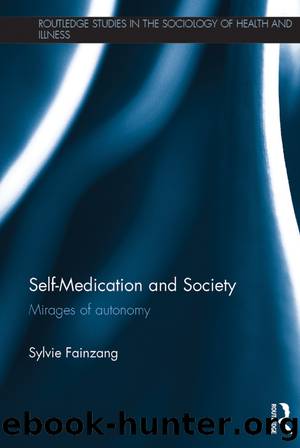Self-Medication and Society by Sylvie Fainzang

Author:Sylvie Fainzang [Fainzang, Sylvie]
Language: eng
Format: epub
Tags: Social Science, General, Sociology
ISBN: 9781315447148
Google: QDFuDQAAQBAJ
Publisher: Routledge
Published: 2016-11-03T04:30:44+00:00
4Knowledge and competence
One of the terms of the debate that rages about self-medication is the competence (Hunter, 2010) of the users, or rather what the health professionals believe to be their incompetence, which mirrors the distrust subjects sometimes feel towards their doctor. Here, I do not seek to takes sides in this debate. Within the remit of such a study, an anthropologistâs role is not to support those who loudly proclaim the existence of a âlayâ knowledge that rivals a professional or âexpertâ knowledge,1 rendering users capable of self-medicating, nor is it to support those who contest this knowledge or who at least reject the competence it would provide in treating oneself through self-medication. Because it is indeed this issue of knowledge that is raised alongside that of competence. Studies into the meaning assigned to the practice of self-medication tend to avoid reflecting on the relationship to knowledge it implies. The authors of the CSA/CECOP (2007) study identified three groups of patients: those for whom self-medication means âtreating oneself without going to see a doctorâ, those for whom it is âseeing a pharmacist to treat oneself without seeing a doctorâ, and those who think it is âchoosing medicines oneself with which to treat oneselfâ. Yet, these three categories do not hold the same status as regards the relationship with medical power, and especially not in terms of the knowledge it is based on, since the first phrase emphasises lay knowledge as opposed to professional knowledge, the second emphasises pharmacist knowledge as opposed to that of the doctor, while the third only emphasises the userâs role as a âconsumerâ. The posture of the user towards knowledge remains unexplored even though these categories can overlap as regards this issue.
We have seen that self-medication is the object of some reservations, notably from the doctors, because they consider it to be often dangerous for the very reason that it is based on insufficient knowledge. They invoke the risk involved either of a âdelay in diagnosisâ or of an incorrect medicinal use. Inversely, recourse to self-medication for the subjects is an expression of their claim to competence, based on their knowledge. I will examine how the diverse forms of knowledge mobilised in self-medication are constituted in order to define the stakes involved in the assertion or denial of this competence. When broaching the matter of user knowledge, it is customary to oppose so-called lay knowledge with professional or expert knowledge. Freidson (1984) proposed the concept of a lay system of reference to account for what leads individuals to share information about their health problems and the agents capable of treating them to guide their choices of care-providers or health services. However we should note that a lay system of reference for Freidson is equivalent to a hierarchical process of searching for information that begins with the least informed and experienced and finishes with those who have the most information and experience, before arriving at the medical care system itself (Aïach and Cèbe, 1991: 12), whereas,
Download
This site does not store any files on its server. We only index and link to content provided by other sites. Please contact the content providers to delete copyright contents if any and email us, we'll remove relevant links or contents immediately.
L Equipe NP by 22793(896)
Application of a Novel Technique for Clinical Evaluation of Nitric Oxide-Induced Free Radical Reactions in ICU Patients by Unknown(740)
Rosenâs Emergency Medicine Concepts and Clinical Practice by Ron Walls; Robert Hockberger; Marianne Gausche-Hill; Timothy B. Erickson; Susan R. Wilcox(603)
Constructing Canine Consent; Conceptualising and Adopting a Consent-focused Relationship with Dogs by ERIN JONES(472)
Oxidative damage to surfactant protein D in pulmonary diseases by Vitality Starosta1 & Matthias Griese1†(447)
Social Science Perspectives on Global Public Health by Vincent La Placa & Julia Morgan(418)
Chassin's Operative Strategy in General Surgery: An Expositive Atlas by Carol E. H. Scott-Conner Andreas M. Kaiser Ninh T. Nguyen Umut Sarpel Sonia L. Sugg(409)
ADVANCED EMERGENCY CARE AND TRANSPORTATION OF THE SICK AND INJURED by Unknown(357)
Irwin and Rippeâs Intensive Care Medicine by Unknown(353)
Organic Chemistry: An Acid - Base Approach by MICHAEL SMITH(340)
Diagnostic and Statistical Manual of Mental Disorders, Fifth Edition, Text Revision (DSM-5-TR(tm)) by Unknown(323)
Access to Medicines and Vaccines in the South : Coherence of Rules and Policies Applied by the European Union Commission by Stephen Kingah(313)
Saunders Nursing Drug Handbook 2024 - E-Book by Unknown(305)
Human Microanatomy; Cell Tissue and Organ Histology with Celebrity Medical Histories by Stephen A. Stricker(292)
Information Technology for Education, Science, and Technics by Unknown(292)
Davis's Comprehensive Manual of Laboratory and Diagnostic Tests with Nursing Implications by Unknown(290)
Socio-Life Science and the COVID-19 Outbreak : Public Health and Public Policy by Makoto Yano; Fumihiko Matsuda; Anavaj Sakuntabhai; Shigeru Hirota(284)
Berne and Levy Physiology E-Book by Unknown(269)
Replacing the Dead by Mie Nakachi;(267)
